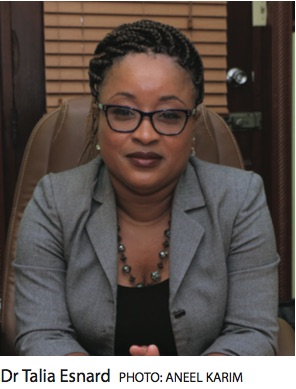
As Dr Talia Esnard prepared to start the first leg of her journey to interview women entrepreneurs across the Caribbean five years ago, she could not have been aware of the powerful insights she would uncover, insights she hopes can influence entrepreneurship as a whole.
She interviewed women in five countries, working “to understand their realities in naturalised spaces”. Their discussions have been essential to her already extensive work on entrepreneurial spheres. They culminated in the senior lecturer and head of the Department of Behavioural Sciences’ latest book, Entrepreneurial Women in the Caribbean: Critical Insights and Policy Implications.
It is a topic close to her heart. “My own observations around how my mother navigated the entrepreneurial space motivated me.”
Her studies have shown that “there isn’t that deliberate consideration of women’s realities in the formation of women’s policies”.
Dr Esnard stresses the need to reconsider the norms and perspectives of entrepreneurship. “It has typically been discussed in relation to the field of management studies, business, and economics.”
She advocates for the importance of the sociological perspective. “We run the risk of not creating policies and interventions that impact the lives of the persons and the actors within the market.”
Her research deepened her consciousness about issues of power in our society and the resulting obstacles certain societal groups face. Her book further explores inclusivity in entrepreneurial spaces.
“How do we encourage issues of diversity,” she asks, “not just in terms of the product that we deliver and the service that we offer, but also about the actors that are in that space and the ways that they define and influence entrepreneurship, both as an activity and as a way of thinking?”
Dr Esnard believes these conversations are essential to encourage policy alterations.
“The work brings a contextual understanding to entrepreneurship,” she explains. “It emphasises the need to redefine, to bridge, and to really open up that conversation between enterprise and entrepreneurship and how do we bridge the gap.”
Her findings, she believes, could rewrite perspectives. For example, her interviewees’ responses suggest a redefinition of entrepreneurial achievement. For them, it is not only economically defined.
“Success for them was about satisfaction, empowerment, self-gratification,” she notes. “The emotions, the mind, and the well-being remain just as important as how the activity around entrepreneurship was able to impact the profit margins of their own businesses.”
Already, Dr Esnard is seeing interest in her work from people like accountants and project managers. She hopes her readers will achieve a consciousness of “the precarious realities” entrepreneurial women face and the need to reassess existing policies.
Her next research forays will include what she says is one of her most important projects – social justice and how women are confronting inequity. This speaks to her passion for scholarship and vision in these areas, as is evident in her latest book’s dedication where she honours “the foot soldiers who paved the way… the women entrepreneurs who have given voice to their struggles and have continued to redefine the space.”
Entrepreneurial Women in the Caribbean: Critical Insights and Policy Implications by Dr Talia Esnard is available in physical and digital copies through Amazon, Barnes and Noble, Springer, Blackwell and Waterstone.